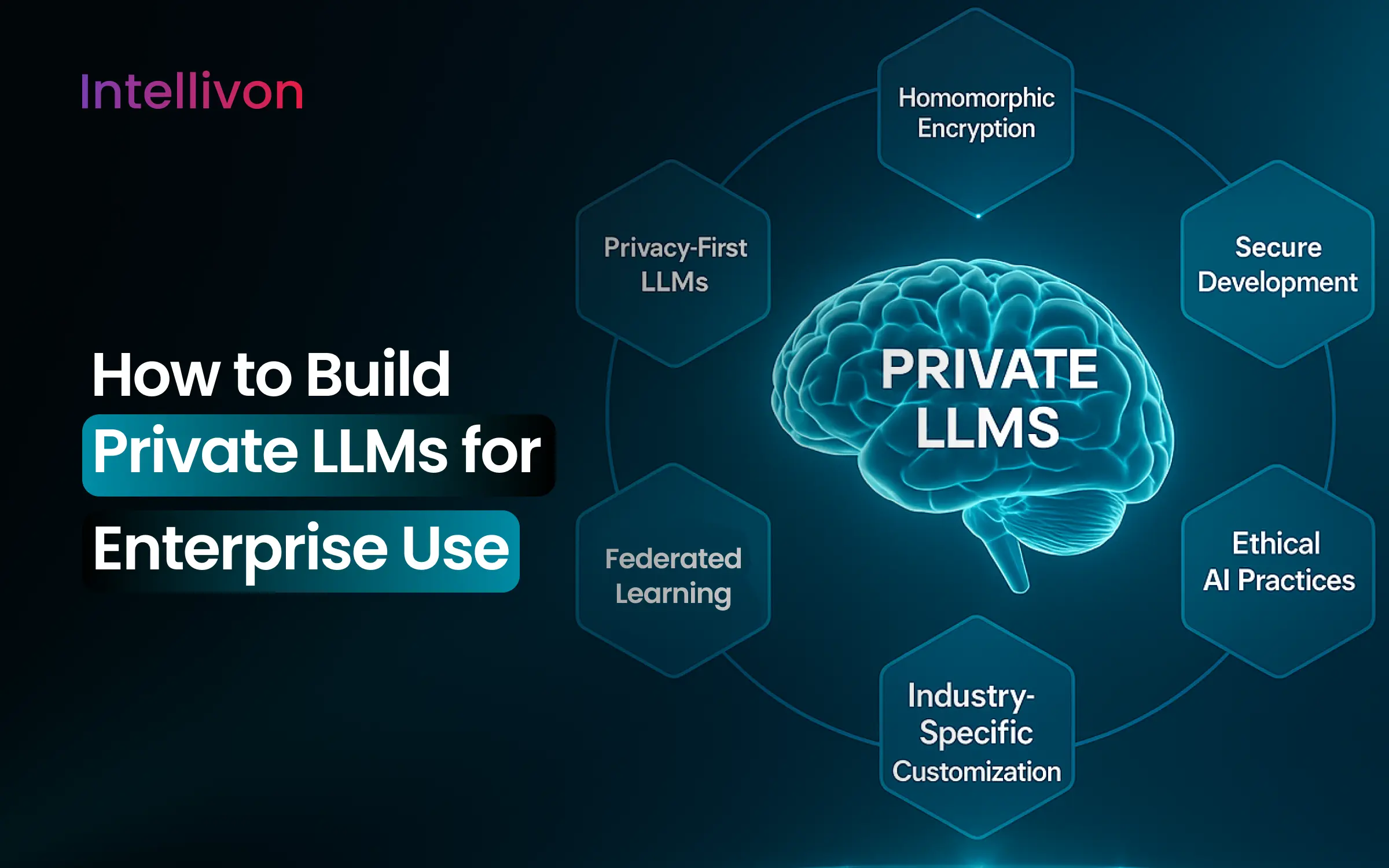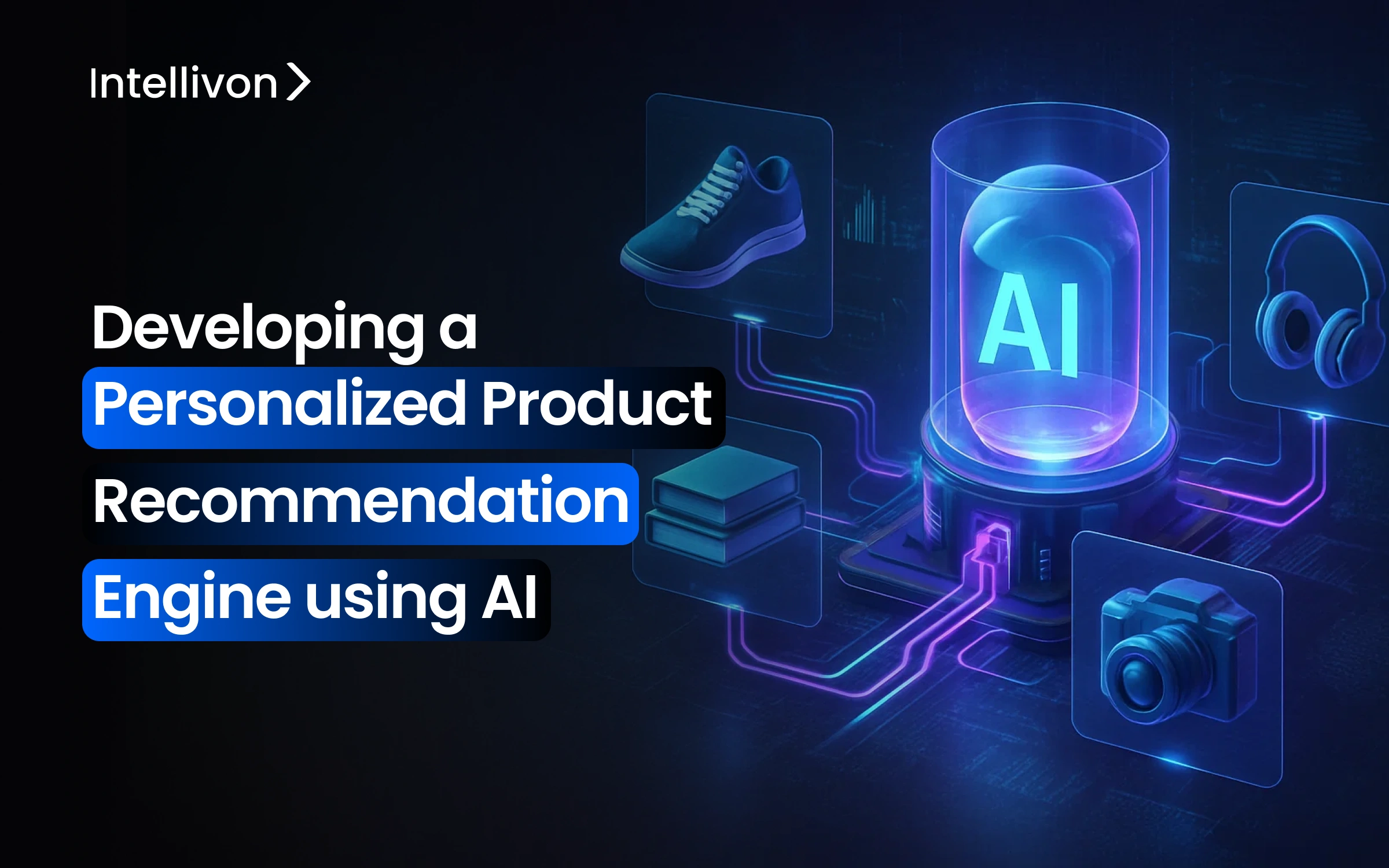Leading the market as a retail enterprise means constantly scaling existing platforms and creating highly individualized shopping experiences that lock in customers for the long run. The real challenge is balancing the growing amount of data, delivering real-time personalized product recommendations, and accurately predicting future preferences. And when you have a fast-growing customer base, as well as a wide range of SKUs, recommending the exact product that your customers need becomes increasingly impossible.
This is where AI-based personalized product recommendation engines come into play. These engines analyze vast amounts of consumer data, allowing retailers to predict and suggest products that mirror each shopper’s unique product preferences. For instance, some of the world’s largest retail brands have benefited from this integration.
- Sephora saw a 25% increase in add-to-basket rate and a 35% increase in conversions after implementing virtual try-on features and AI-powered personalized recommendations.
In this blog, we’ll explore how retail enterprises can leverage these AI-powered recommendation engines to manage growing data, accurately predict customer preferences, and hyper-personalize recommendations. We will also look at how these AI-powered engines work, why you should get them integrated into your platform, how to develop the engine, and some key challenges along with their solutions. With Intellivon’s deep expertise in implementing and scaling enterprise-grade AI solutions tailored to retail needs, our pre-vetted AI experts help your enterprise in driving hyper-personalized customer journeys.
Why Your Retail Enterprise Needs Personalized Product Recommendations
AI-powered personalized shopping experiences help businesses keep customers coming back, with up to 44% of repeat purchases driven by this approach. To boost loyalty and sales, it’s important to give customers a personalized experience every time they shop with you. This makes them feel valued and encourages them to return.
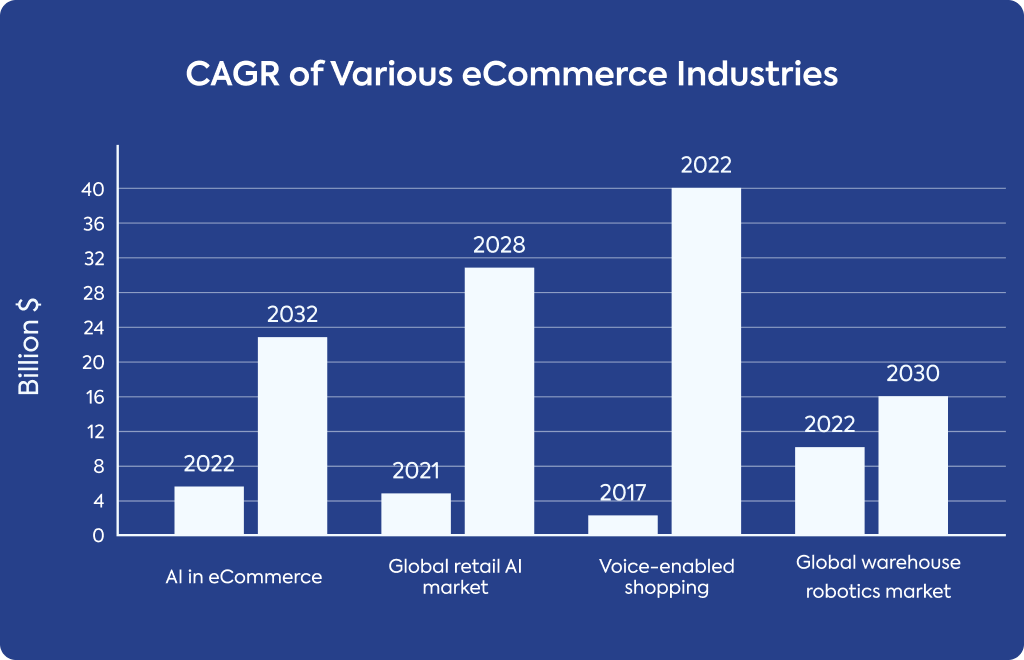
- Personalized shopping experiences can boost retail revenue by 40%.
- Product recommendations can lead to a 300% revenue increase, 150% rise in conversion rates, and 50% growth in average order values.
- AI adoption in eCommerce was valued at $5.81 billion in 2022, expected to reach $22.6 billion by 2032 (14.60% CAGR).
- 71% of customers expect personalized interactions.
- 76% of customers feel frustrated when their personalization expectations aren’t met.
- 63% of shoppers say AI-driven product recommendations influence their purchases.
- 83% of consumers are open to browsing or buying products through messaging.
- Personalized recommendations help customers find products they love, leading to higher cart values.
- Personalized product recommendations contribute up to 31% of e-commerce revenue.
- Companies that excel at personalization generate 40% more revenue than those that don’t.
Personalization is key to creating a customer-first retail experience. AI-driven recommendations and customized shopping journeys have been shown to boost engagement, improve retention, and increase average order value.
For large enterprises, investing in personalized experiences is essential for staying competitive in today’s rapidly evolving retail market. Intellivon offers tailored AI solutions that empower large retail enterprises to deliver customized product recommendations, enhancing customer engagement and driving sales growth.
How AI Product Recommendation Engines Work
At the heart of AI product recommendation engines are algorithms that analyze user data to suggest relevant products. They work by analyzing user data, such as browsing history and previous purchases, to understand preferences. For example, Amazon suggests products based on past purchases, while Spotify recommends music based on your listening habits. This data is stored in cloud systems like AWS or Google Cloud, allowing it to scale as needed.
Once the data is collected, it’s processed using machine learning and other techniques to identify patterns. These patterns help predict what a user might like next, allowing the system to offer personalized recommendations. The system then filters and presents these suggestions, which become more accurate as it gathers more data over time.
1. Types of AI Product Recommendation Engines:
AI personalized product recommendation systems come in various types, each designed to meet specific needs and improve product suggestions. They are segregated into the following types:
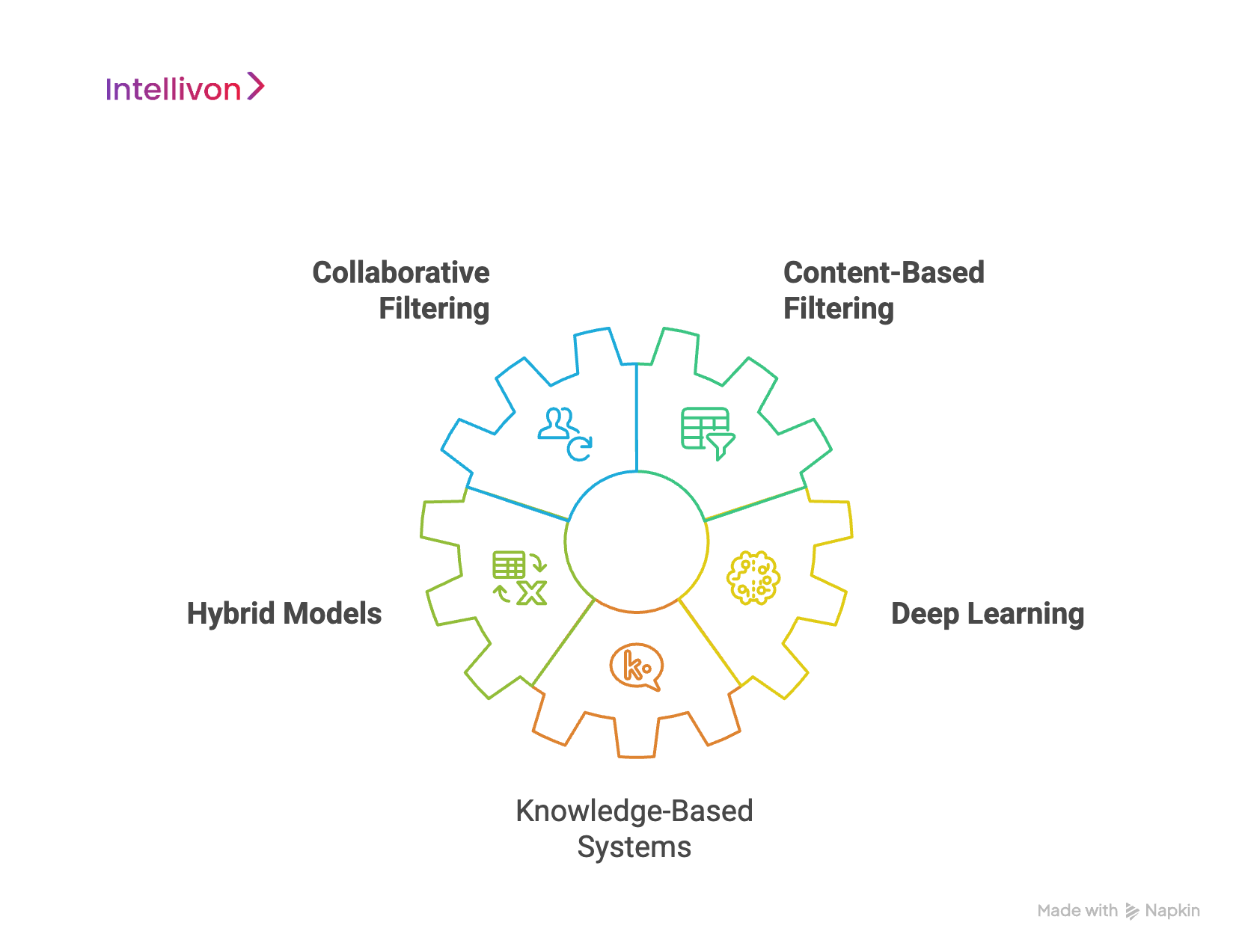
1. Collaborative Filtering
This method suggests products based on the preferences of users with similar tastes. For example, if Customer A and Customer B have similar purchase histories, the system might recommend products that Customer B bought to Customer A. It’s like getting advice from a friend with similar tastes.
2. Content-Based Filtering
This approach recommends products based on characteristics that the user has shown interest in before. For instance, if a shopper frequently buys running shoes, the engine will suggest other running shoes or related products like athletic wear or accessories. Essentially, it matches product features with user preferences.
3. Hybrid Models
Many recommendation engines combine collaborative filtering and content-based filtering to provide more accurate results. By blending these approaches, the system can refine its suggestions, offering a more personalized experience and improving recommendation accuracy.
4. Deep Learning
Deep learning models analyze vast amounts of data to identify complex patterns in customer behavior. These systems go beyond simple preferences, learning from interactions and continuously refining recommendations. For example, deep learning can predict a customer’s future interests based on subtle, long-term patterns in their activity, providing highly personalized suggestions that evolve over time.
5. Knowledge-Based Systems
Knowledge-based recommendation engines rely on explicit information about a user’s needs and preferences. For instance, if a customer is searching for a specific product, such as a laptop with certain specifications, the system will recommend products that meet those exact criteria. This method works well when users have specific requirements or when there’s limited historical data available.
2. Types of Data Used in Building AI Recommendations
Data is the foundation of any successful AI personalized product recommendation engine. Without high-quality data, the system’s recommendations will fall short. Here’s how different types of data play a crucial role:
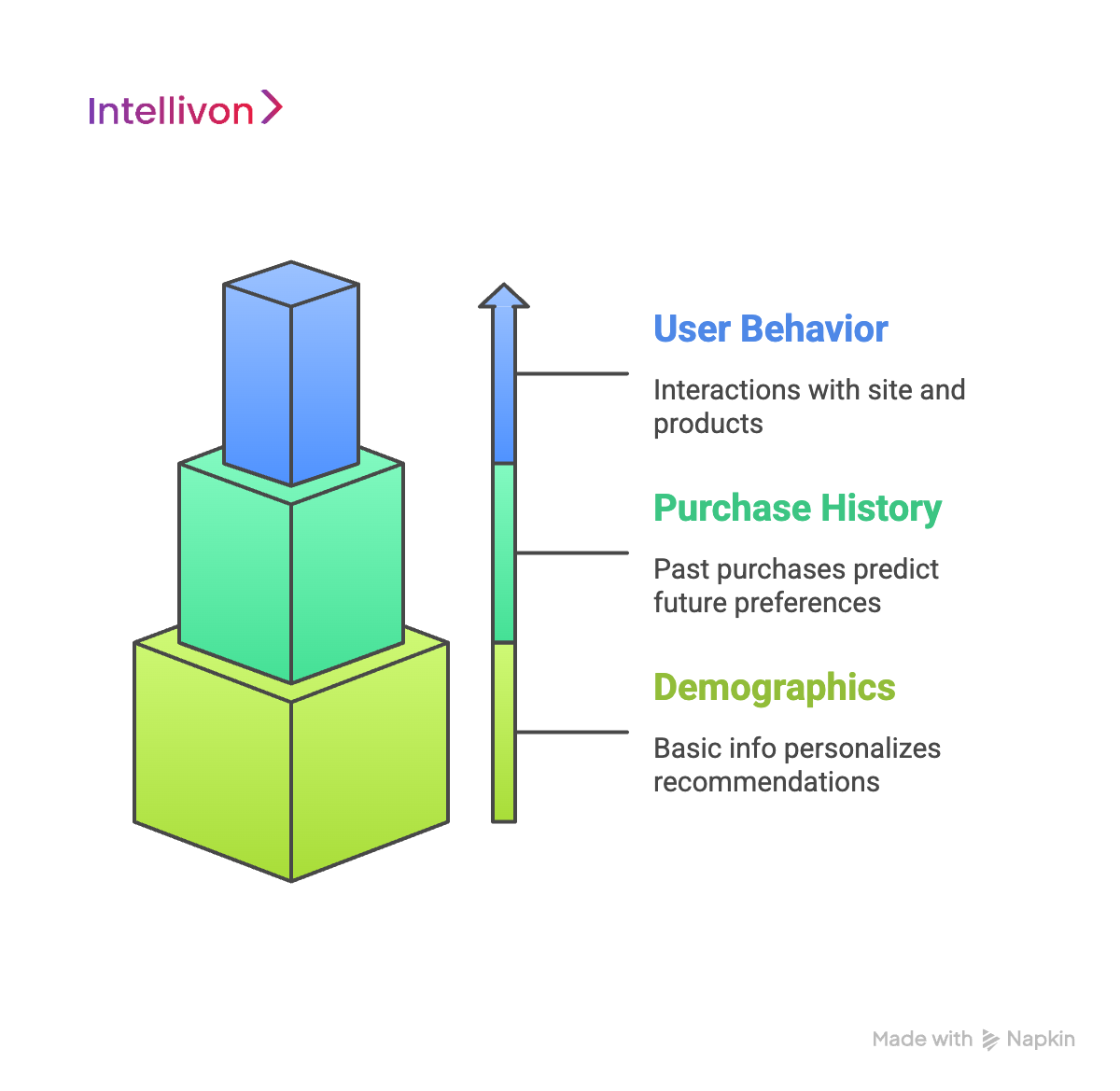
1. User Behavior
The way customers interact with your site, what they click on, how long they stay on a page, and which products they view or purchase. helps the system understand their preferences. This behavioral data enables the engine to fine-tune its suggestions and make them more relevant over time.
2. Purchase History
Knowing what a customer has bought in the past helps predict future preferences. For example, if a customer frequently buys eco-friendly products, the engine might suggest similar sustainable options they haven’t yet discovered.
3. Demographics
Basic information, such as age, location, and gender, can further personalize the experience. A customer in a colder climate might receive more recommendations for jackets and winter wear, while someone in a warmer area might be shown summer clothing and accessories.
Enterprises can harness this data by integrating it into the AI model, ensuring that it’s clean, up-to-date, and comprehensive. The more data the system has, the better it can refine its recommendations to match individual customer preferences.
3. Benefits of Using AI Product Recommendation Engines
The real-time personalization feature in AI-based personalized product recommendation engines offers an array of benefits for retail enterprises that wish to deliver personalized customer experiences and increase retention rates.
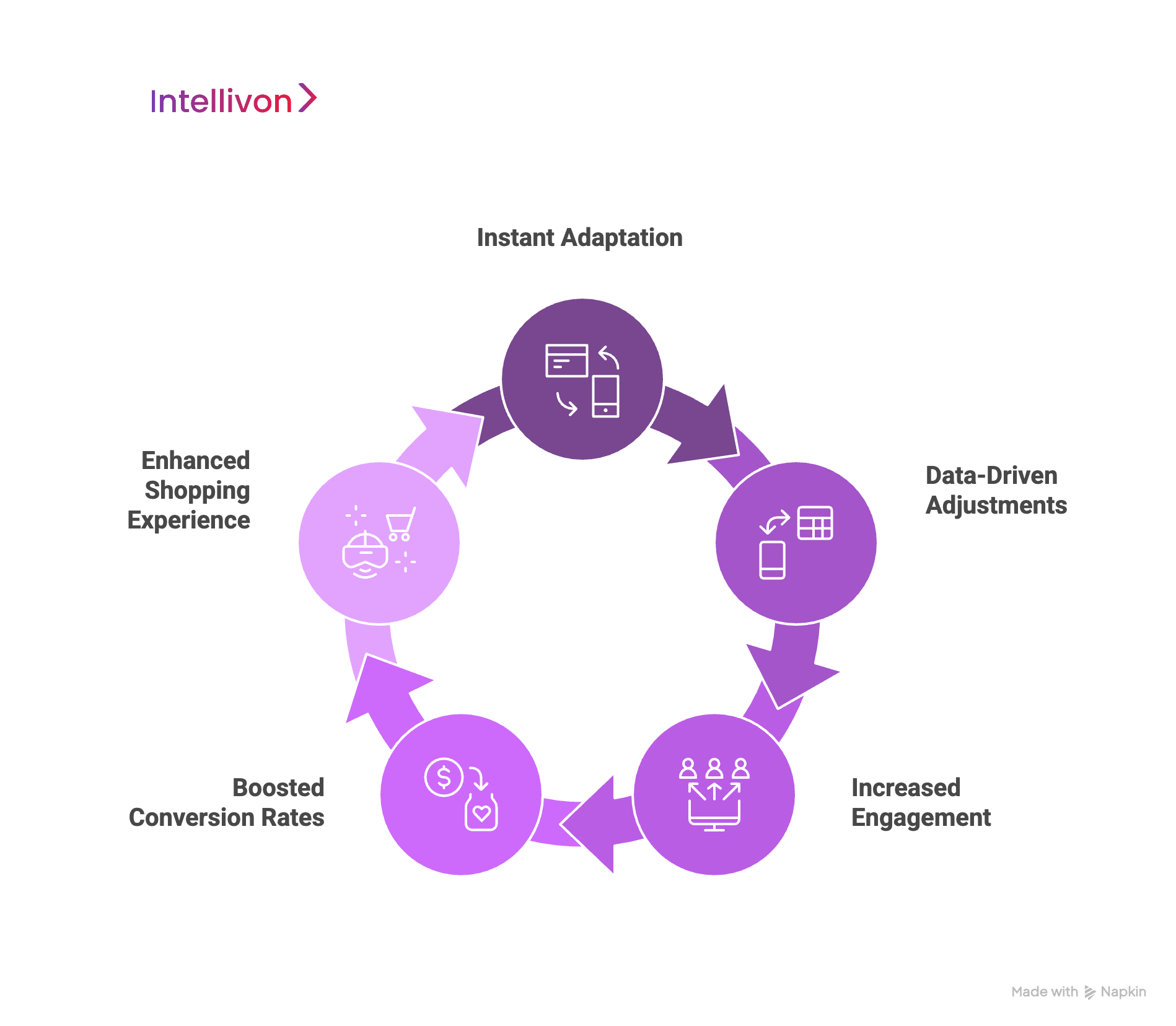
1. Instant Adaptation
Unlike traditional recommendation systems that rely on pre-set algorithms, real-time AI personalized product recommendation engines can instantly adjust based on customer behavior. For example, if a shopper adds shoes to their cart, the engine quickly analyzes their choice and suggests related products such as socks, shoe care items, or even matching accessories. This immediate adaptation creates a more fluid and personalized shopping experience, ensuring that the products recommended are always relevant to the shopper’s current intent.
2. Data-Driven Adjustments
Real-time personalization thrives on continuously analyzing customer actions in real-time. Whether a shopper is viewing a product, adding it to their cart, or even spending time browsing a category, the system processes each interaction instantly. This allows the engine to update its recommendations on the fly, ensuring the most accurate suggestions based on the shopper’s current interests and behavior. As a result, the recommendations become increasingly precise, offering products the user is more likely to engage with or purchase.
3. Increased Engagement
Real-time AI systems are designed to keep shoppers engaged by offering highly personalized, relevant suggestions as they browse. The more closely the recommendations match a customer’s current preferences, the more likely they are to continue exploring the site. For instance, if a customer is interested in a specific category, personalized suggestions related to that category will prompt further exploration. This constant stream of relevant product ideas enhances engagement by keeping customers invested in the experience and reducing the chances of them abandoning the site.
4. Boosted Conversion Rates
By delivering tailored recommendations at the right moments, real-time AI systems make it easier for customers to find exactly what they need, often leading to quicker purchasing decisions. When customers see products that match their immediate interests, whether they’re complementary items or alternatives, they’re far more likely to complete a purchase. For example, recommending a matching handbag when a customer buys a dress or offering product upgrades helps drive conversions by adding relevant items to their consideration set.
5. Enhanced Shopping Experience
Real-time personalization makes shopping more enjoyable. By instantly adapting to a customer’s preferences, the system creates a smooth, frictionless shopping experience that feels intuitive and personalized. Shoppers are more likely to feel valued and understood, which increases satisfaction and encourages return visits. Furthermore, real-time engines also use features like “frequently bought together,” “complementary products,” and “you may also like” to offer additional tailored recommendations.
Features Your AI Personalized Product Recommendation Engine Must Have
Enterprises need robust, scalable solutions that align with their complex systems and business goals. Here are the must-have features that a personalized recommendation engine should offer for enterprise-level retail businesses:
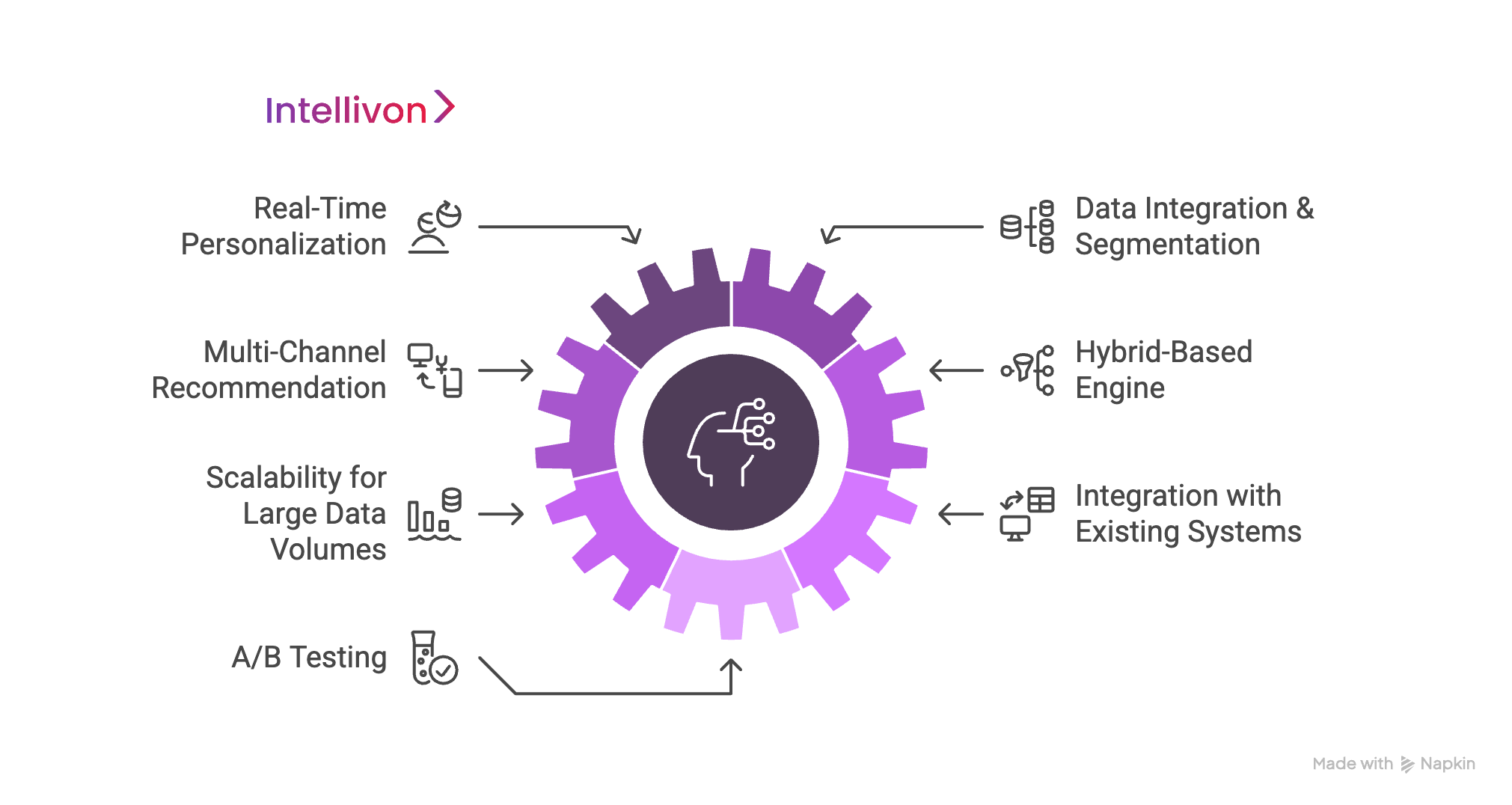
1. Real-Time Personalization
Enterprises must leverage AI systems that provide real-time adjustments to product recommendations based on customer actions. Whether a shopper is browsing products, adding items to their cart, or making a purchase, the engine should instantly adapt and offer the most relevant products.
2. Data Integration & Segmentation
For enterprises handling vast amounts of customer data, an AI recommendation engine must seamlessly integrate with various data sources. Whether it’s user behavior, transaction history, or demographic information, the engine should be able to process and analyze data from multiple touchpoints across your organization. It should also offer advanced segmentation capabilities, enabling businesses to target different customer profiles, whether they are new visitors, loyal customers, or high-value shoppers.
3. Multi-Channel Recommendation
In the enterprise world, customers interact with your brand across multiple channels, including websites, mobile apps, email, in-store experiences, and social media. A robust recommendation engine must support multi-channel personalization, delivering consistent and relevant product suggestions across all these platforms. For large enterprises, this means being able to offer personalized experiences whether customers are browsing on a desktop, shopping through a mobile app, or receiving customized emails.
4. Choosing a Hybrid-Based Engine
Enterprises should look for recommendation engines that utilize both collaborative filtering and content-based filtering for optimal results. Collaborative filtering uses user behavior data to suggest products based on the preferences of similar customers. In contrast, content-based filtering recommends products based on the specific features a user has shown interest in. Hybrid models that combine both methods tend to produce more accurate and personalized results, improving customer satisfaction and increasing conversion rates.
5. Scalability for Large Data Volumes
As enterprises grow, so does the amount of data they need to process. A key feature of any enterprise-level recommendation engine is scalability. It must be capable of handling massive amounts of customer and product data while ensuring that the system remains fast, responsive, and accurate. Cloud-based solutions, such as AWS or Google Cloud, offer the infrastructure to handle large-scale operations and support future growth without sacrificing performance
7. Integration with Existing Legacy Systems
Large enterprises often operate on complex tech stacks with various platforms and systems in place. The AI recommendation engine must integrate smoothly with existing e-commerce platforms, CRM systems, and marketing tools. Whether you’re using Salesforce, SAP, or other enterprise solutions, the engine should be capable of syncing data effortlessly across your systems to ensure consistency and accuracy in your product recommendations.
8. A/B Testing
Enterprise-level recommendation engines need the ability to continuously improve and optimize. A/B testing is a crucial feature that allows businesses to test different recommendation algorithms, UI layouts, and product groupings to determine what drives the best results. Enterprises should be able to experiment with various strategies and refine the engine based on data-driven insights to maximize conversion rates and revenue.
Intellivon ensures that your AI-powered recommendation engines include these essential features, allowing your enterprise to create personalized, seamless, and scalable shopping experiences that drive higher engagement, increased sales, and improved customer loyalty.
How We Develop AI Personalized Recommendation Engines For Enterprises
Implementing an AI-powered personalized product recommendation engine can seem complex, but with the right approach and support, it can be a seamless process that drives significant value for your business. Intellivon provides end-to-end support for enterprises, ensuring each phase of the project is handled expertly. Here’s a step-by-step breakdown of the process:
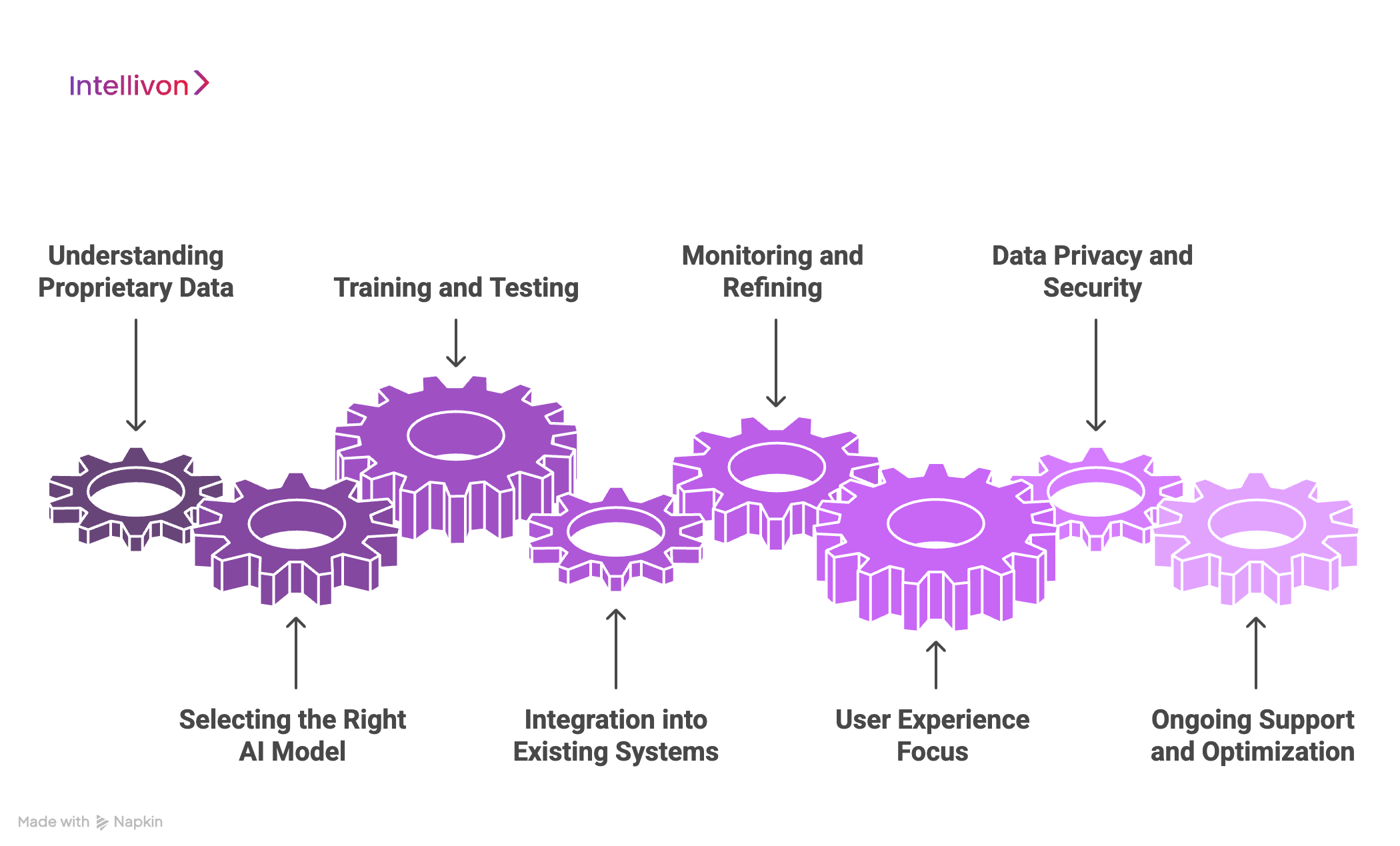
1. Understanding Your Proprietary Data
Before developing a recommendation engine, it’s essential to gather the right data. This includes:
- Transactional Data: Past purchase behavior, order history, and shopping cart data.
- Behavioral Data: How users interact with your site, what they browse, click on, or engage with.
- Demographic Data: Basic customer information such as age, location, gender, and more.
Intellivon helps businesses identify and collect this data from various sources, ensuring it’s structured and ready for analysis. We provide guidance on which data points are most valuable for your specific needs.
2. Selecting the Right AI Model
Choosing the right AI model is critical for delivering personalized recommendations. The main options include:
- Collaborative Filtering: Suggests products based on similarities in user behavior.
- Content-Based Filtering: Recommends products based on attributes the user has shown interest in.
- Hybrid Models: Combines both approaches for more accurate results.
Intellivon collaborates with you to select the most suitable model based on your business goals and data, ensuring that your recommendations are effective and scalable.
3. Training and Testing Your Recommendation Engine
Once the data is collected and the model is chosen, training the recommendation engine is the next step. This phase involves:
- Algorithm Optimization: Ensuring the AI model is fine-tuned to deliver the most relevant product suggestions.
- Testing: Running simulations and A/B testing to validate the engine’s effectiveness.
We work closely with your team to continuously optimize the engine, ensuring it performs at its highest potential. We conduct thorough testing to guarantee the accuracy and relevance of our recommendations.
4. Integration into Existing Systems
To maximize the potential of your recommendation engine, seamless integration with your existing legacy systems is essential. This includes:
- eCommerce Platforms: Ensuring the recommendation engine works seamlessly within your website or app.
- CRM Systems: Integrating with customer relationship management tools to personalize suggestions based on detailed customer profiles.
We manage the integration process, ensuring that the recommendation engine fits smoothly into your current tech stack without disrupting your operations.
5. Monitoring and Refining the Engine
After the recommendation engine is live, ongoing monitoring is crucial to ensure it continues to deliver optimal results. This includes:
- Tracking Performance: Monitoring key metrics such as engagement rates, conversion rates, and revenue impact.
- Model Refinement: Continuously refining the model based on new data, seasonal trends, and changes in customer behavior.
Our experts provide continuous monitoring and support, making adjustments as necessary to keep the recommendation engine performing at its best over time.
6. User Experience Focus
Throughout the development and implementation process, it’s essential to focus on user experience (UX). The recommendation engine should be non-intrusive intuitive, and enhance the overall shopping experience.
Intellivon ensures the recommendation system is designed to blend seamlessly into the customer journey, making product suggestions that feel natural and helpful without being disruptive.
7. Data Privacy and Security
As enterprises handle large volumes of sensitive customer data, ensuring privacy and security is essential. The recommendation engine must comply with data protection regulations such as GDPR and CCPA.
We keep a data and privacy first policy to safeguard customer data, ensuring that all data handling, processing, and storage adhere to the highest security standards, keeping your business and customers protected.
8. Ongoing Support and Optimization
The work doesn’t stop once the recommendation engine is deployed. Ongoing support and optimization are key to maintaining its effectiveness in the long term.
Intellivon provides continuous support, from addressing technical issues to offering strategic insights on improving the recommendation process. As customer behavior evolves, the system should adapt, keeping your enterprise ahead of the curve.
Cost of Developing a Personalized Product Recommendation Engine Using AI
Throughout the development of your AI-powered personalized product recommendation engine, we focus on providing a solution that aligns with your enterprise goals. We carefully manage costs to ensure you receive the best value while delivering a seamless, high-quality experience for your customers.
| Step | Low Range Cost | High Range Cost |
| Data Collection & Analysis | $20,000 | $50,000 |
| AI Model Selection | $40,000 | $100,000 |
| Model Training & Testing | $30,000 | $70,000 |
| Integration with Existing Systems | $20,000 | $50,000 |
| Real-Time Personalization & Multi-Channel Support | $40,000 | $100,000 |
| Scalability & Cloud Infrastructure | $15,000 annually | $40,000 annually |
| Continuous Monitoring & Model Refinement | $20,000 annually | $50,000 annually |
| User Experience Design & UX Testing | $15,000 | $40,000 |
| Data Privacy & Security | $10,000 | $25,000 |
| Ongoing Support & Optimization | $20,000 annually | $50,000 annually |
Please note that these cost ranges are approximations, and the overall expense of developing an AI-powered personalized product recommendation engine for large retail enterprises can range from $10,000 to $100,000 USD, depending on your unique needs. For a more precise quote, don’t hesitate to contact us for a free consultation.
Overcoming Common Challenges in AI Product Recommendation Implementation
Implementing an AI-powered product recommendation engine offers great potential, but large enterprises often face challenges such as data quality, scalability, and user trust. Additionally, integrating AI with legacy systems and addressing privacy concerns are key hurdles. In this section, we’ll discuss these common challenges and provide best practices for overcoming them.
| Challenge | Description | Best Practices |
| Data Quality and Quantity | Gathering high-quality, structured data while ensuring compliance with data privacy regulations. | Data Collection from multiple sources, Data Quality through cleaning, Privacy Compliance through encryption and anonymization. |
| Scalability for Large Enterprises | Scaling recommendation engines to handle large datasets and high traffic loads. | Leverage scalable cloud infrastructure, implement load balancing, optimize system performance regularly. |
| User Trust and Transparency | Ensuring transparency and data security to build trust with users. | Be transparent with data usage, provide consent options, and invest in robust security measures. |
| Integration with Existing Legacy Systems | Integrating AI solutions with legacy systems without disrupting existing processes. | Use API integration, adopt a modular approach, ensure data synchronization with legacy systems. |
1. Data Quality and Quantity
One of the biggest challenges in implementing AI-powered product recommendation engines is gathering high-quality data in sufficient quantities. AI algorithms rely on large amounts of clean, structured data to deliver accurate recommendations. If the data is incomplete, outdated, or poorly organized, the recommendation engine will produce less reliable results. Furthermore, with the increasing focus on data privacy regulations (such as GDPR and CCPA), enterprises must ensure that customer data is collected and processed in a secure and compliant manner.
Best Practices:
- Data Collection: Make sure your data comes from multiple sources, including purchase history, browsing behavior, and demographic information.
- Data Quality: Implement data cleaning processes to remove duplicates, correct errors, and ensure consistency.
- Privacy Compliance: Use encryption and anonymization techniques to protect customer data, and always follow best practices for compliance with relevant privacy laws.
2. Scalability for Large Enterprises
As large enterprises handle vast amounts of customer data, scaling AI recommendation engines can be a technical challenge. A solution that works for a small dataset may not perform well when processing millions of records. Businesses require a recommendation system that can efficiently process large-scale data while maintaining both speed and accuracy, particularly during peak traffic periods.
Best Practices:
- Cloud Infrastructure: Leverage scalable cloud platforms like AWS, Google Cloud, or Azure that can handle fluctuating data loads and support growth over time.
- Load Balancing: Implement load balancing strategies to ensure that the system can scale horizontally by adding more servers as needed.
- Continuous Optimization: Regularly monitor the system’s performance and optimize algorithms to improve efficiency and response times.
3. User Trust and Transparency
AI recommendations can sometimes raise concerns regarding transparency and data security. Customers want to know how their data is being used and why specific products are being recommended. Without clear communication, businesses risk losing customer trust, which can impact engagement and conversion rates.
Best Practices:
- Transparency: Be open with customers about how their data is being used and how the recommendations are generated. This can be done through privacy policies and customer communications.
- Consent: Provide customers with options to opt-in or opt-out of data collection, ensuring that they have control over their personal information.
- Security: Invest in robust security measures, such as data encryption and secure access protocols, to protect customer data and ensure trust.
4. Integration with Existing Legacy Systems
Many large enterprises rely on legacy systems that may not be easily compatible with modern AI-powered recommendation engines. Integrating these systems with AI solutions can be a complex and time-consuming process. However, this integration is essential for a seamless and effective recommendation engine that utilizes existing customer data and works well with current e-commerce platforms and CRM systems.
Best Practices:
- API Integration: Use APIs to connect your AI engine with existing legacy systems. This allows for easy data exchange without disrupting current processes.
- Modular Approach: Adopt a modular approach to integration, starting with small, manageable components of the system and gradually scaling.
- Data Synchronization: Ensure that data is synchronized between the recommendation engine and legacy systems to maintain consistency and accuracy.
Intellivon is well-equipped to help enterprises overcome these common challenges. Our AI-powered tools are specifically designed to address the unique needs of large organizations with complex data structures and legacy systems. With Intellivon’s expertise, retail enterprises can implement a recommendation engine that not only meets their current needs but also adapts to future growth and evolving customer expectations.
Future Trends To Look Out For In AI Personalized Product Recommendations
The future of personalized product recommendations is rapidly evolving with AI, offering retailers the ability to deliver more tailored and dynamic shopping experiences than ever before. From hyper-personalization and real-time predictions to omnichannel engagement and privacy-conscious solutions, these trends are reshaping how businesses interact with customers.
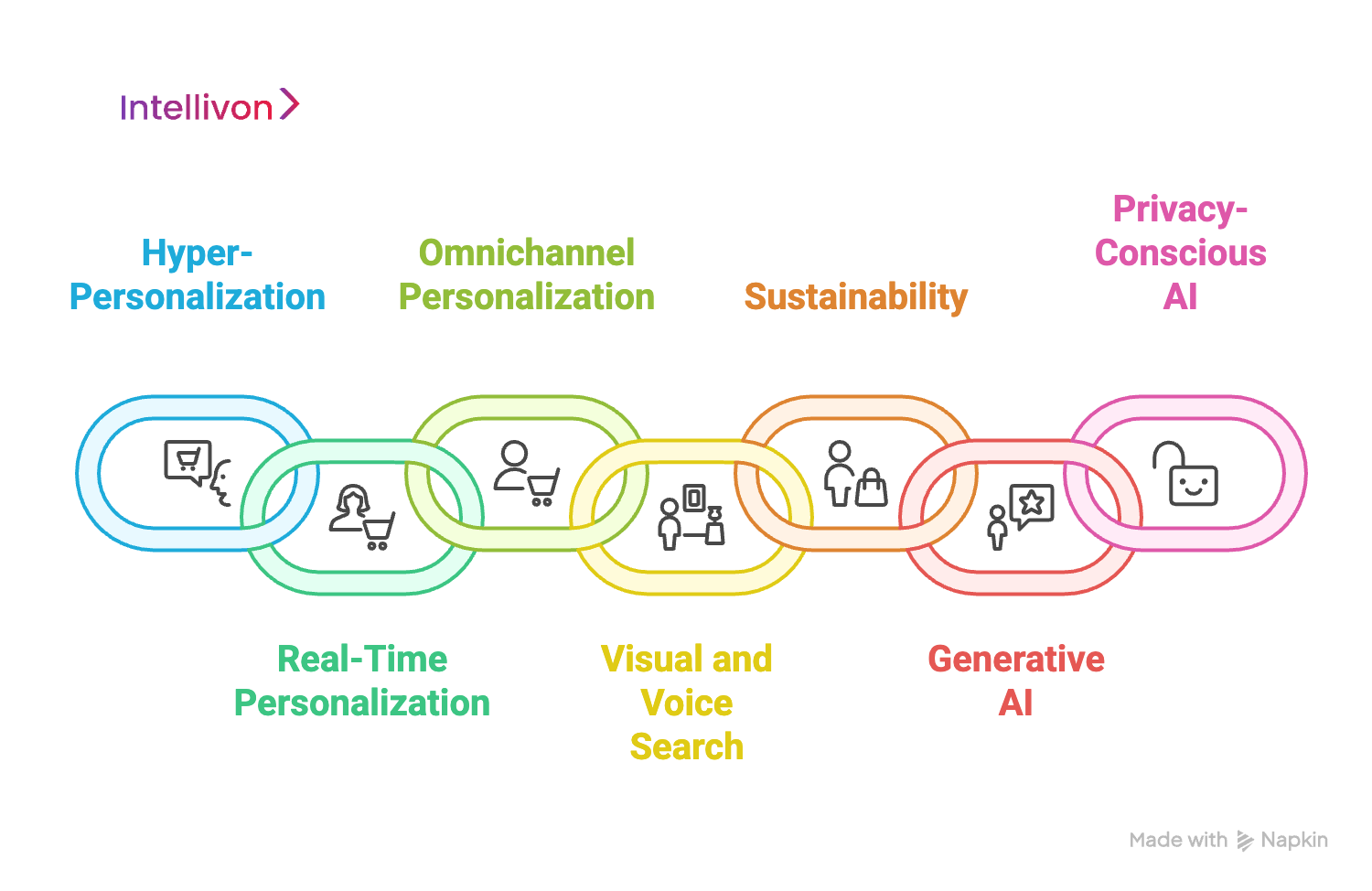
1. Hyper-Personalization at Scale
AI is transforming the way retailers engage with customers, pushing personalization far beyond simple product suggestions. By 2030, AI systems will have the ability to analyze not just purchase history and browsing habits, but also real-time context such as emotional cues and environmental factors. 70% of consumers now expect AI-enhanced personalized experiences, and 63% are more likely to buy from brands that deliver them.
For example, an AI recommendation engine might suggest warm coats during a cold snap or offer event tickets when it detects a local festival is taking place. This hyper-personalized approach allows businesses to cater to customers in ways that feel uniquely tailored to their needs and current circumstances, making it a key differentiator in an increasingly competitive retail market.
2. Real-Time and Predictive Personalization
AI is now capable of adapting to customer needs as they arise, creating a more dynamic shopping experience. As customers browse websites or shop through apps, AI can predict their preferences and offer personalized suggestions even before they express them. Retailers using predictive personalization already see a 87% increase in customer satisfaction and engagement, with shoppers praising AI’s positive impact on their experiences.
For instance, if the system notices an interview on a customer’s calendar, it might recommend formal attire. Similarly, if the weather forecast predicts rain, the system could suggest raincoats or umbrellas. This ability to predict needs in real-time improves customer satisfaction by providing relevant products at just the right moment.
3. Omnichannel Personalization
Personalization is no longer confined to just one platform. AI is enabling a seamless, personalized experience across all customer touchpoints, whether online, via mobile apps, or in physical stores. 82% faster resolution times and 73% customer satisfaction rates are achieved when AI is integrated into customer service across channels
Customers can receive consistent, tailored recommendations no matter where they interact with a brand. In-store, AI-powered devices help employees offer personalized advice and provide real-time inventory updates, ensuring that customers receive the same high level of attention whether they’re shopping in person or online.
4. AI-Driven Visual and Voice Search
AI is also improving the way customers search for products. Visual search allows customers to upload an image of a product they like and receive personalized matches based on style and preferences. This is particularly useful in areas like fashion and home décor, where style matters most.
Similarly, voice search is becoming more popular as customers use voice assistants to shop hands-free. AI systems are not just recognizing spoken words but also understanding the context behind the request, making the search process smoother and more intuitive.
5. Sustainability and Circular Commerce
AI is driving a shift toward more sustainable shopping practices by helping customers make eco-friendly choices. By analyzing data such as the environmental impact of products or the lifecycle of an item, AI can recommend second-hand products, rentals, or even repair services. This approach aligns with the growing trend of circular commerce, where products are reused, recycled, or repurposed, reducing waste and promoting sustainability.
6. Generative and Agentic AI
Looking ahead, AI will take on more proactive roles in personalizing the shopping experience. Generative AI will be used to create personalized content, offers, and dynamic ads tailored to individual preferences. This means that every ad or promotion a customer sees will feel uniquely relevant to them. Already, 87% of shoppers using Gen AI tools report a positive impact on their shopping experiences.
Additionally, agentic AI will act almost like a shopping assistant, nudging customers toward products or experiences that align with their interests, without them even having to ask.
7. Privacy-Conscious Personalization
As concerns about data privacy continue to grow, AI systems are evolving to respect user consent while still delivering a personalized experience. With regulations like GDPR and increasing customer demand for privacy, AI is finding ways to personalize recommendations while ensuring that user data is handled securely and transparently.
This will enable businesses to deliver the benefits of personalized shopping experiences without compromising customer trust or violating privacy laws.
Top 5 Retail Enterprises Using AI Personalized Product Recommendation Engines
Many top retail enterprises are leveraging AI-powered personalized product recommendation engines to enhance customer experiences and drive sales. By analyzing customer behavior, preferences, and trends, these retailers offer tailored suggestions that increase engagement and loyalty. Here are five leading companies that are successfully using AI to transform their shopping experiences.
1. Amazon

Amazon utilizes generative AI to enhance product recommendations and descriptions, tailoring suggestions based on individual shopping behaviors and preferences. This approach has significantly contributed to Amazon’s sales, with personalized recommendations accounting for 35% of its revenue.
2. Netflix

Netflix utilizes AI to deliver personalized content recommendations, analyzing users’ viewing history and preferences. This strategy has been instrumental in driving user engagement, with 75% of viewer activity being influenced by personalized suggestions.
3. Walmart

Walmart has implemented AI-powered recommendation engines to personalize shopping experiences across its platforms. This initiative has led to a 10% increase in sales, demonstrating the effectiveness of AI in enhancing customer satisfaction and driving revenue growth.
4. Target

Target uses AI to offer personalized product recommendations, resulting in a 15% increase in average order value. By analyzing customer data, Target’s AI systems offer personalized suggestions that align with individual preferences, thereby boosting sales and customer loyalty.
5. Sephora

Sephora leverages AI to analyze customer feedback and preferences, enhancing product recommendations and store layouts. This data-driven approach allows Sephora to offer personalized shopping experiences, improving customer satisfaction and engagement.
Conclusion
AI-personalized product recommendation engines are essential for enhancing customer engagement and boosting sales. AI is revolutionizing the retail industry by delivering highly tailored experiences that anticipate customer needs based on their behavior and preferences. This technology helps retailers create seamless shopping journeys that drive customer loyalty and increase conversions across all channels.
As AI continues to shape the future of retail, enterprises that leverage personalized recommendations will stay ahead of the curve, offering customers experiences that feel uniquely tailored to their needs and desires.
Why Choose Intellivon For an AI Product Recommendation Engine?
At Intellivon, we are well-equipped to help retail enterprises seamlessly create and integrate AI-powered personalized product recommendation engines into their existing legacy systems. We go beyond installation, ensuring the recommendation engine continuously evolves to meet the demands of growing inventories and shifting customer preferences through comprehensive post-deployment monitoring and maintenance.
Why Choose Us?
- Proven Success in AI-Driven Projects- We’ve successfully delivered numerous AI projects, helping businesses achieve significant improvements in customer engagement, sales, and satisfaction.
- 11+ Years of Expertise in AI Solutions- With over a decade of experience, we bring in-depth knowledge of AI technologies, ensuring optimal performance and reliability.
- Mastery of 40+ AI, ML, and Data Tools – Our team is proficient in a wide range of AI, machine learning, and data tools, enabling us to tailor solutions to your specific business needs.
- 200+ Dedicated AI Experts – With a dedicated team of over 200 pre-vetted AI professionals, we have the talent and resources to deliver high-quality, scalable solutions.
FAQs
Q1. What is a Personalized Product Recommendation Engine using AI?
A1. An AI-powered personalized product recommendation engine uses machine learning to analyze user data—such as browsing history, past purchases, and preferences—to suggest relevant products, improving the shopping experience and boosting sales.
Q2. How do these engines actually work?
A2. These engines use techniques like collaborative filtering (recommending based on similar users’ choices), content-based filtering (suggesting items similar to those a user liked), or a hybrid approach that combines both to make smart predictions.
Q3. What are the main benefits for businesses?
A3. Benefits include higher sales through upselling and cross-selling, improved customer engagement and satisfaction, better conversion rates, enhanced loyalty, and valuable insights into customer preferences.
Q4. What are the biggest challenges in developing one?
A4. Challenges include handling the cold start problem (new users or products), data sparsity, ensuring scalability for large catalogs and user bases, maintaining data quality, and addressing privacy concerns.
Q5. What data is essential for building an effective engine?
A5. Key data includes explicit feedback (ratings, reviews), implicit behavior (browsing history, purchases, search queries), and detailed product metadata (categories, descriptions, pricing).

